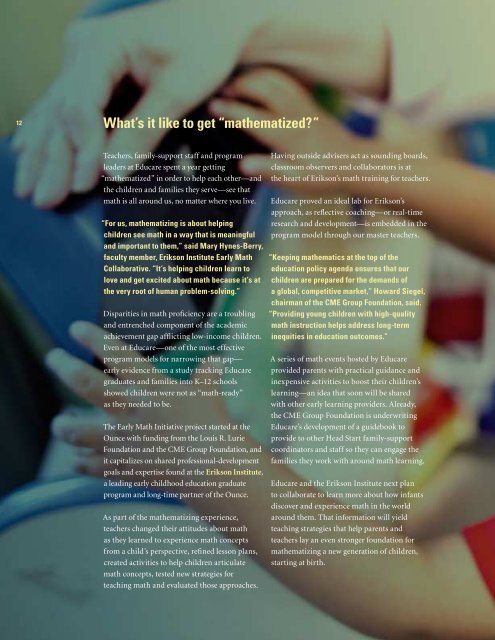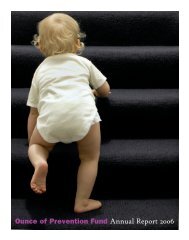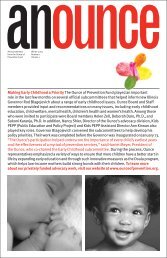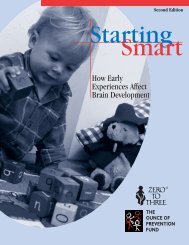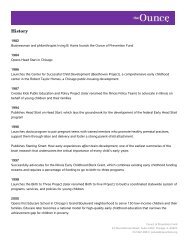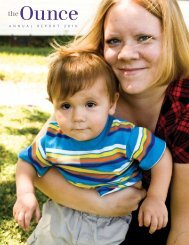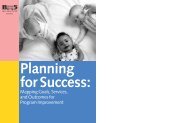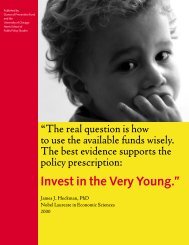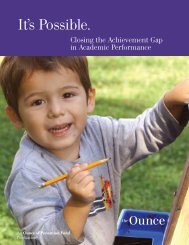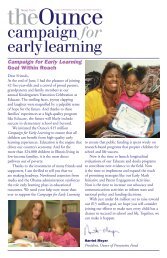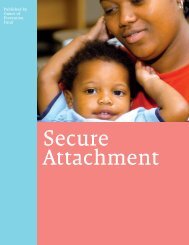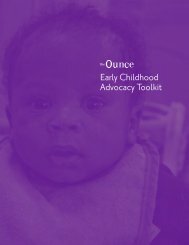The Ounce of Prevention 2012 Annual Report
The Ounce of Prevention 2012 Annual Report
The Ounce of Prevention 2012 Annual Report
Create successful ePaper yourself
Turn your PDF publications into a flip-book with our unique Google optimized e-Paper software.
12<br />
What’s it like to get “mathematized”<br />
13<br />
Teachers, family-support staff and program<br />
leaders at Educare spent a year getting<br />
“mathematized” in order to help each other—and<br />
the children and families they serve—see that<br />
math is all around us, no matter where you live.<br />
“For us, mathematizing is about helping<br />
children see math in a way that is meaningful<br />
and important to them,” said Mary Hynes-Berry,<br />
faculty member, Erikson Institute Early Math<br />
Collaborative. “It’s helping children learn to<br />
love and get excited about math because it’s at<br />
the very root <strong>of</strong> human problem-solving.”<br />
Disparities in math pr<strong>of</strong>iciency are a troubling<br />
and entrenched component <strong>of</strong> the academic<br />
achievement gap afflicting low-income children.<br />
Even at Educare—one <strong>of</strong> the most effective<br />
program models for narrowing that gap—<br />
early evidence from a study tracking Educare<br />
graduates and families into K–12 schools<br />
showed children were not as “math-ready”<br />
as they needed to be.<br />
<strong>The</strong> Early Math Initiative project started at the<br />
<strong>Ounce</strong> with funding from the Louis R. Lurie<br />
Foundation and the CME Group Foundation, and<br />
it capitalizes on shared pr<strong>of</strong>essional-development<br />
goals and expertise found at the Erikson Institute,<br />
a leading early childhood education graduate<br />
program and long-time partner <strong>of</strong> the <strong>Ounce</strong>.<br />
As part <strong>of</strong> the mathematizing experience,<br />
teachers changed their attitudes about math<br />
as they learned to experience math concepts<br />
from a child’s perspective, refined lesson plans,<br />
created activities to help children articulate<br />
math concepts, tested new strategies for<br />
teaching math and evaluated those approaches.<br />
Having outside advisers act as sounding boards,<br />
classroom observers and collaborators is at<br />
the heart <strong>of</strong> Erikson’s math training for teachers.<br />
Educare proved an ideal lab for Erikson’s<br />
approach, as reflective coaching—or real-time<br />
research and development—is embedded in the<br />
program model through our master teachers.<br />
“Keeping mathematics at the top <strong>of</strong> the<br />
education policy agenda ensures that our<br />
children are prepared for the demands <strong>of</strong><br />
a global, competitive market,” Howard Siegel,<br />
chairman <strong>of</strong> the CME Group Foundation, said.<br />
“Providing young children with high-quality<br />
math instruction helps address long-term<br />
inequities in education outcomes.”<br />
A series <strong>of</strong> math events hosted by Educare<br />
provided parents with practical guidance and<br />
inexpensive activities to boost their children’s<br />
learning—an idea that soon will be shared<br />
with other early learning providers. Already,<br />
the CME Group Foundation is underwriting<br />
Educare’s development <strong>of</strong> a guidebook to<br />
provide to other Head Start family-support<br />
coordinators and staff so they can engage the<br />
families they work with around math learning.<br />
Educare and the Erikson Institute next plan<br />
to collaborate to learn more about how infants<br />
discover and experience math in the world<br />
around them. That information will yield<br />
teaching strategies that help parents and<br />
teachers lay an even stronger foundation for<br />
mathematizing a new generation <strong>of</strong> children,<br />
starting at birth.<br />
ADDING IT ALL UP:<br />
IMPROVING MATH<br />
INSTRUCTION<br />
A child’s ability to master basic math skills can <strong>of</strong>ten<br />
predict his chances for succeeding in school better than<br />
his reading and social-emotional skills. Children are<br />
born with natural math abilities, but the school and home<br />
environments needed to fully nurture those skills <strong>of</strong>ten<br />
are sorely lacking, particularly for low-income children.<br />
US students’ math-pr<strong>of</strong>iciency ratings are plummeting<br />
compared to those in other developed nations, but a<br />
partnership between the <strong>Ounce</strong> and the Erikson Institute<br />
is generating creative ideas for strengthening the math<br />
knowledge and teaching skills <strong>of</strong> birth-to-five educators.<br />
Those teachers can, in turn, spark enthusiasm about<br />
numeracy starting with the very youngest children, so<br />
that they start elementary school confident, eager and<br />
ready to take on the challenges <strong>of</strong> math.<br />
<strong>Ounce</strong> <strong>of</strong> <strong>Prevention</strong> Fund: <strong>2012</strong> <strong>Annual</strong> <strong>Report</strong>


